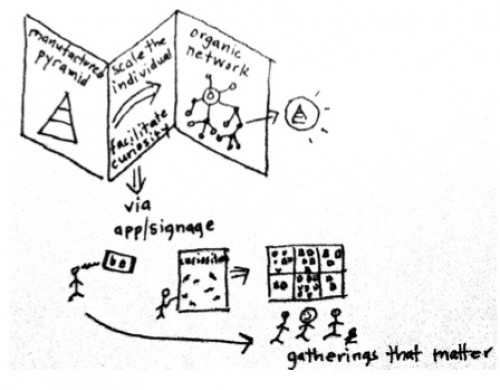To Hasten Equity...Scale the Individual

Public education could be the most accelerating venue for social change. Rather than waiting for any of the incredible [past, current and ongoing] innovations in redefining public education to scale, imagine we scale the individual. Imagine a new (old) narrative that can start anywhere because it begs no prep or training. Imagine we trust simplicity enough to give it a go. Imagine hastening equity and ongoing sustainability.
IDEC is an annual global conference that circulates to the US every 10 years. From August 4-8, 2013, it will be hosted at CU-Boulder. We’re taking advantage of this opportunity to bring the startup ecosystem to academic environments.
Currently academia is still heavily immersed in a mentality of efficiency. That translates to spending most of our time, money, and people on ways to measure, prove, and defend. Imagine we use the startup expertise that is Boulder CO, to not only model a more humane experience when people gather, but also a more humane experience in public education. If our intentions are for public, concerning all the people, and we acknowledge that one size does not fit all, we need a shift from the standardization efficiency begs.
Three things to learn from start-up land:
[quotes from Andrew Hyde in Startup Communities: Building an Entrepreneurial Ecosystem in Your City by Brad Feld]
1. Open time and space matters
“The best stuff at conferences happens in hallways and the after-parties, so I thought about simply structuring an event as a giant hallway. We could just create a free, decentralized event—no badges, no specific venue, and no checking in. The entire event would be one big hallway through the Boulder startup community.”
Things that stick with us come from just-in-time stories, from facilitating authentic curiosities, and from the community -- gatherings that matter.
2. Free-form matters
Accordingly, the CU New Venture Challenge identified three objectives: (1) collapse the campus: convene cross-disciplinary congregations and stimulate interaction across departments.
Holistic, zoom-out visioning matters. We’ve manufactured our own disability -- most of us can’t see the forest for the trees. We need to reel back in to life, with the big picture.
3. Aggregating the chaos from 1 and 2 (above) matters
2) Create an entrepreneurial launch pad: provide a campus platform that answers the question, “Where do I start if I want to do a startup?”; and (3) provide a pipeline to the community: The CU New Venture Challenge should be a point of entry for CU students and faculty to get meaningfully involved in the region’s startup scene.
Getting back to a more balanced view, [i.e. it is legal to think for yourself], may be difficult at first. Using tech to facilitate initial shock, and to connect people and information, will keep us from giving up when we’re almost there.
We are crafting a 10-month launch toward IDEC 2013, based on our last four years of research to redefine public education.
We’re curious to see if we can use tech, i.e. the app, to facilitate curiosities and gatherings that matter to people in a city, [first Loveland, CO, because that’s where we are, and then Kampala, Uganda and Jackson, MS, to see if the narrative can go anywhere. Here we are prototyping the app idea in Loveland.]
We’re also curious to use tech to disrupt the formality of a conference. We hope to start an exponentiating addiction to the scaling of individuals. Finding out what gets people out of bed in the morning, the thing they can’t not do. We’re hoping this might then become a global launch to the hastening of equity, giving everyone a go. disrupting the formality of a business plan via the be lab
disrupting the formality of a business plan via the be lab
--
Banner and secondary image credit: Courtesy of monika hardy